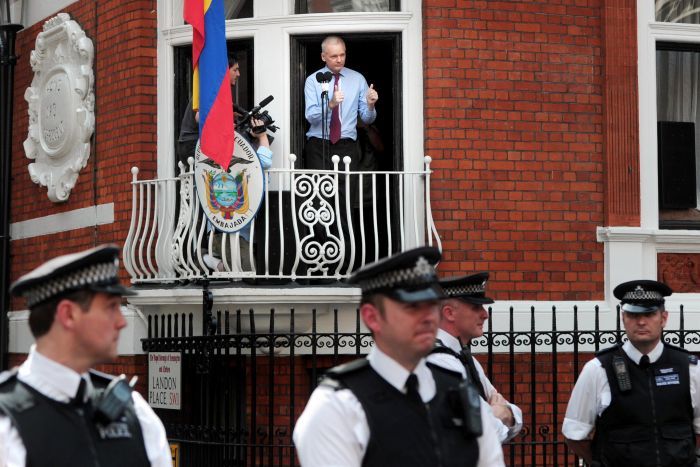WikiLeaks founder Julian Assange has called for the United States to drop the “aggressive” investigation into WikiLeaks and himself, and has confirmed he intends to leave the protection of Ecuador’s London-based embassy “soon.”
At a press conference held Monday at the Ecuadorian Embassy in London, where the WikiLeaks founder has been granted asylum for the past two years, the country’s ambassador said:
“The situation must come to an end. Two years is too long. It is time to free Assange. It is time for his human rights to be respected.”
On Sunday, Ecuadorian foreign minister Ricardo Patino told The Guardian that the UK government holds no real interest in finding a diplomatic solution to the problem, and in addition, he believes that Assange’s human rights are being violated. Patino claims that by refusing to allow Assange to leave the building in over two years — due to the threat of arrest — the WikiLeaks founder is being denied basic human rights and dignity.
On Sunday, Ecuadorian foreign minister Ricardo Patino told The Guardian that the UK government holds no real interest in finding a diplomatic solution to the problem, and in addition, he believes that Assange’s human rights are being violated. Patino claims that by refusing to allow Assange to leave the building in over two years — due to the threat of arrest — the WikiLeaks founder is being denied basic human rights and dignity.
The last time the 43-year-old stepped foot outside the small building — where his movements are restricted to a small set of rooms — was in June 2012. Ecuador granted political asylum based on an investigation taking place by US authorities. Reports also suggested that Assange sought political asylum after Swedish authorities moved to arrest him due to allegations of rape and sexual assault by two women, which Assange claimed on Monday were “false.”
Two months after receiving shelter from the Ecuadorian Embassy and praising Ecuador’s asylum bid as “courageous,” Assange said at a press conference that the US-led “witch hunt” against Wikileaks must stop, and the US government must not “persecute its staff and its supporters.” Assange also said journalists should be protected against “shining the light on the secret crimes of the powerful.”
This message is now being sent again, with the WikiLeaks founder claiming that the US investigation “puts all publishers and all journalists at risk.”
United States officials have been investigating WikiLeaks — which allows for the anonymous submission of whistleblower documents — since the publication of US military and government-related documents in 2010. Assange believes that should he leave the embassy, he will also be at risk of extradition to the United States to face unknown charges related to the WikiLeaks whistleblower website.
While the Ecuadorian government will continue to offer Assange protection and hold talks with both Sweden and the UK to try and break the legal standoff, Assange questioned the “four year” investigative period in which no public charges have been laid against him. The WikiLeaks founder also asked why this situation has been allowed to arise in Europe in the first place — where a suspect is held and their movement restricted for years while the United States potentially builds up a case against them.
The UK government maintains police presence 24 hours a day outside of the embassy to prevent Assange from exiting the building, at an estimated cost to the British taxpayer of at least £7 million so far.
On Monday, Sky News reported that Assange was possibly planning to surrender following the two-year standoff with UK authorities. When questioned over this report in the press conference, the 43-year-old said, “I can confirm I am leaving the embassy soon, but perhaps not for the reasons the Murdoch press are saying.”
No more details concerning this departure have yet been revealed, leaving more questions than answers.
Reports have surfaced over the last few days which suggest that two years of entrapment within the embassy has resulted in Assange’s degrading health. According to an interview with the Daily Mail, Assange is suffering from a potentially life-threatening heart condition, has a chronic lung complaint and dangerously high blood pressure.
Ecuador has asked UK officials to allow Assange safe passage outside of the embassy in a medical emergency, which has been refused, according to Patino, who said:
“The British government hasn’t taken any steps in that direction. We have made proposals, we have submitted documents, and all we have seen on the part of the British government is an increase in security to make sure Julian Assange does not leave the embassy, but there has been no political will or any steps taken towards a diplomatic solution to this.”
In relation to his health, Assange told reporters:
“As you can imagine, being detained in various ways in this country without charge for four years, and in this embassy for two years [..] being without an outside area or sunlight, it is an environment in which any healthy person would find themselves with certain difficulties they would have to manage.”
The UK Foreign Office said last week the government remains “as committed as ever to reaching a diplomatic solution,” and “we are clear that our laws must be followed and Mr Assange should be extradited to Sweden.” In contrast, Ecuador has said it would prosecute the UK in an international court if it refused to grant Assange safe passage to Ecuador, something which is still being considered by the UK foreign office.





